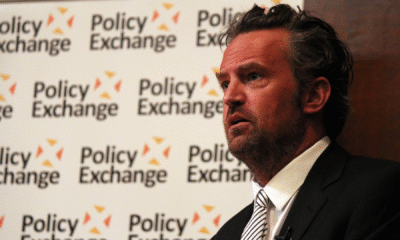featured
The Leader Of The National Cannabis Industry Association Is Stepping Down, 15 Years After Launching The Group
Published
2 days agoon

Aaron Smith is stepping down as head of the National Cannabis Industry Association (NCIA), leaving a legacy of forging partnerships to advance reform on what was once seen as a marginalized issue that has now become mainstream over the course of his work. Next, he’ll be pursuing another ambitious project: Helping to dissolve broader partisan gridlock that’s endemic in U.S. politics.
Smith, who got his start in the grassroots advocacy world working with organizations such as the Marijuana Policy Project (MPP), has served as the co-founder and executive director of NCIA for the past 15 years. He’s had a front row seat to the rapid evolution of the sector, which he tells Marijuana Moment is now at a pivotal “crossroads” amid competing interests and challenging politics.
But while keenly aware that it will take a stepped-up push from all stakeholders to deliver on the small and large goals of the movement—from banking access to ending federal prohibition altogether—Smith says he’s compelled to take on a new role outside of the industry. He’ll be staying on NCIA’s board, but his time as CEO is coming to an end as he seeks to leverage his experience building bridges and affecting change in a different capacity.
Smith’s message to the industry and advocates? “This is the time to put the pedal to the metal.”
As for NCIA, the board will be taking on the outgoing CEO’s functions in the short-term, spearhead by board chair Adam Rosenberg, as the organization rethinks its strategy to deliver for businesses and consumers alike at this inflection point in state and federal marijuana policy.
Smith is “confident” the board and the association’s leadership are more than up to the task as he departs.
“I really don’t think there are members of the NCIA out there that joined because of me personally. It’s always been about the institution, which is run by the members,” he said. “The members select the board. The board is leading the organization. And I’m confident that the organization is in good hands.”
He added that he’d “really look forward to just seeing continued engagement from the industry,” emphasizing “the need to invest in these reforms.” As he put it, while there are economic pain points for the sector that might limit operators’ ability to aggressively put dollars toward any particular legislation or issue, those cannabis businesses out there that aren’t at least trying to support basic much-needed reforms are sitting idle at their own peril.
“If you’re part of a cannabis industry, you’re part of a social movement—and the movement is not done yet,” he said.
Marijuana Moment spoke to Smith ahead of his departure, scheduled for August 15, discussing his experience with NCIA, remaining challenges within the industry and the future of cannabis policy. This interview has been edited for length and clarity.
Marijuana Moment: You got your start in a more conventional nonprofit advocacy world at MPP. What was it like to transition into a more hybrid industry-advocacy role with NCIA?
Aaron Smith: It was a very different time. I mean, it was a time that the industry and the advocacy communities were essentially one and the same. But we perceived that the industry was beginning to grow beyond that core group, and that’s when we made the decision to start NCIA—we being Steve Fox and myself.
And so the transition was sort of seamless and very logical at the time. It just made sense. It was a natural evolution.
A lot of it was a messaging shift—from talking about the issue just from this sort of broader ‘doing what’s right for the country’ agenda that we had, to just the nuts and bolts of what it takes to run a business and talking about things like taxes and banking and those sort of practical issues.
MM: There are some who worry about the growing influence of industry interests in this space and how that could impact more grassroots, consumer-focused advocacy work. Do you share that concern?
AS: I do. Because I think policy needs to be balanced to ensure it’s serving the interests of all the constituencies.
Of course, I’m representing the business community—but it’s very important that consumers have a stake, and that public health and other interests have a stake, in driving policy reform forward.
I’m also concerned because the industry’s resources seem to be quite limited. And there are those concerned that, as the philanthropic [funding] has kind of moved away, thinking the industry would pick up the slack, the industry hasn’t really been able to. And while the industry is putting in a significant investment—I’m not saying it’s insignificant—we’re not where we should be in terms of the kind of money that you see behind an effort to get this thing over the finish line.
MM: In you opinion, what needs to change to rebalance that dynamic and help the industry obtain the resources to meet the moment?
AS: I know we’re in sort of a catch-22, because a lot of it changes on federal reform—putting 280E [the IRS code blocking marijuana businesses from taking federal tax deductions] in the rearview mirror would make a whole lot of difference in our ability to invest in policy. But of course, that’s not going to happen unless we invest more in policy reform.
But I think that a lot of this, at least when speaking to the industry, comes down to the individual level, where every single person who’s invested in the cannabis industry—whether they’re starting their own business or they’re an investor in another part of the industry—needs to be invested in cannabis reform.
Otherwise it’s frankly foolish to even get involved, because this industry is in a precarious position. Its success hinges upon the success of organizations like ours that are driving reform forward. And to bet your life savings on a cannabis business without putting anything into cannabis reform is just, frankly, foolish. And unfortunately, the vast majority of businesses in the space, that’s exactly the approach they’ve taken.
It’s challenging for me, and I would say, even if for whatever reason these businesses aren’t looking to join NCIA, they should be contributing to another organization or doing something, because doing nothing is essentially guaranteeing the demise of the industry. I feel like we’re at crossroads right there, right now. This is the time to put the pedal to the metal.
MM: What comes next with NCIA as far as leadership and priorities go?
AS: In the short-run, [NCIA is transitioning] the leadership authority to the board as a whole, under the direction of Adam Rosenberg, who’s our board chair—effectively as an acting CEO. But really he’s just going to continue being the chair. The board’s going to to take over the leadership role that was under the CEO. But as part of that, the board’s also promoting our chief strategy officer, Brooke Gilbert to the COO position to handle day-to-day operations, staff management and keeping the trains running on time, so to speak. And Brooke has been well-known. She’s been at the organization for 12 years, is well-known by the members and has been a kind of the driving force behind the scenes for a long time.
My role has been CEO, but a lot of my role has also been the COO sort of function, too, so the board decided to bifurcate it that way, and that’s in the short-run. In the long-run, over the coming months or however long it takes the board—I plan on staying on the board. I’m currently a board member and the CEO, so I’m resigning as CEO, and at the board’s invitation, will be remaining on the board for the foreseeable future.
Then in the long-run, [NCIA will be] reevaluating everything about the organization and evaluating the needs for what’s the best CEO for this membership, for this organization—the best attributes and qualities that it would take to bring the organization to the next level, and then conducting a thorough national search. I can’t really give you a timeline on when it’s going to be complete, but it’s starting effectively now.
And I think, though, in the interim, the interim leadership is strong. You have staff who’ve been here for years and years, and then a board that’s very engaged and energized about the organization. It made it easier. It made it easier for me to step out of my role knowing—just you know how great this board is right now, and that you know how engaged they are.
MM: At a higher level, what do you think might be achievable for the industry and movement under an often unpredictable Trump administration?
AS: I think there’s a lot on the table still. I think federal rescheduling is probably the best bet because it’s something that the president can do with the stroke of a pen and he’s already stated strong support for federal rescheduling and even beyond that. Just today we got a new DEA administrator in place. So I don’t think we’re going to see this happen tomorrow, but I think there’s a real good chance that this could happen by the end of the year.
Then beyond that, I think [rescheduling] alone would send a signal to Congress that the administration is behind reform. It would make a lot easier to get reforms like the SAFE Banking Act through and other incremental types of reforms.
Then, going into longer term, after that NCIA will be advocating for the legacy operators. While rescheduling to Schedule III will fix 280E for everybody going forward, you have thousands of businesses that have been saddled with the staff tax debt and that needs to be resolved. That’s something that NCIA will be making a priority in the nearest of time.
MM: Do you have a memory or two from your time at NCIA that stands out to you?
AS: I think that one of my favorite things has always been our annual fly-in lobby days—seeing that grow and change over the years. It’s always been my favorite time of year at a lot of levels, because it’s a great time to really engage with our membership in a deeper way than we do at, let’s say, a regular event where we’re just kind of networking and hanging out for two hours. It’s a two-day working experience. But it’s also just a great way to gauge the temperature of Congress. And when I started this, just getting meetings with a member of Congress was really, really hard—and then if you got that meeting, it was like just jokes and poking fun and eye rolls the whole time.
Most of the time today, fast forward, I shouldn’t say we might have the majority of the House on board with legalization, but if we don’t, we’re very close to it and the industry is taken very seriously, even by those who oppose us. It’s really just a great opportunity to kind of see everything on display and connect the members, and I hope to contribute, or I hope to participate, just as a board member next year and knowing to the future,
What about a standout memory with a lawmaker?
AS: We’ve had some great champions over the years. One of the great memorable moments that comes to mind is just meeting with [Sen. Mitch McConnell (R-KY)] on this issue over the long period of his history—from getting to the point where his office ready to talk to us to where he was open to at least hemp reform. We had a fundraiser that I think you guys reported on. We were trying to keep it secret, but it was leaked. You guys picked it up years ago, but at a golf club in Orange County.
It was great experience, because it gave me some real perspective for him as well. He was very kind of professorial and giving us his whole spiel on what the role of the Senate is from his perspective and at the same time, hearing all of these stories from the cannabis industry. It was clear that was far from the first time that he’d heard that. It was just very powerful, because he talked about 280E and banking, so somebody who’s in a position of authority and that level of authority at that particular time in the industry was pivotal.
What can you share about what you’re doing next in your career?
AS: I’m taking on a role as political director in an organization called Unite America. They work on structural electoral reforms aimed at reducing political polarization and improving functioning government— so things like open primaries, ranked choice-related voting, independent redistricting reform.
As it intersects, anybody who’s looked at this issue can see this incredible progress that cannabis has made over at the state level, usually at the ballot box—but we’re all frustrated because Congress can’t seem to get even the most incremental, modest reform such as the SAFE Banking Act across the finish line. And that’s because the political polarization and the incentives within our system reward gridlock and punish members of Congress who reach across the aisle to try to find solutions.
This is an area I’ve been following kind of since January 6, I guess I could say. I followed this organization and that issue as sort of a systemic solution to many of the nation’s problems, including cannabis reform. And you could look at the SAFE Banking Act a few years ago, where we had Democratic trifecta across government, we all thought we were going to get this thing passed, and you all of a sudden had [then-Senate Majority Leader Chuck Schumer (D-NY) and Sen. Cory Booker (D-NY)] talking about, you know, laying down on the tracks and not letting this thing pass unless we can insert all of these social justice provisions, which then turned off the Republicans, dragged the process on past Christmas and it never happened.
That little kind of anecdote that I think everybody in this industry has been following remembers is the primary problem, and it’s because Chuck Schumer is concerned about getting primaried from the left, and so he’s got to pander to that part of the his constituency, rather than the state of New York, which overwhelmingly would like to see him get progress on SAFE Banking rather than just grandstanding on issues that, while I support some of those issues, they’re still sort of niche left wing issues.
So it’s really about trying to get more elected officials in place that are more willing to compromise and achieve progress on this issue and many, many others.

Author: mscannabiz.com
MScannaBIZ for all you Mississippi Cannabis News and Information.
You may like
-


Bipartisan Coalition Of 32 Attorneys General Pushes Congress To Urgently Pass Marijuana Banking Bill
-


Marijuana And CBD Provide ‘Significant Symptom Relief’ For Inflammatory Bowel Disease Patients, Federally Funded Study Finds
-


Doctor Who Allegedly Said ‘I Wonder How Much This Moron Will Pay’ Pleads Guilty
-


Killing reported at Oklahoma marijuana grow operation
-


Texas Voters Want Synthetic THC Outlawed, Poll Shared By Proponents Of Reining In Hemp Industry Finds
-


Judge rejects No Savage’s rap culture argument – NBC4 Washington
featured
Bipartisan Coalition Of 32 Attorneys General Pushes Congress To Urgently Pass Marijuana Banking Bill
Published
5 hours agoon
July 26, 2025
A bipartisan coalition of 32 state and territory attorneys general from across the U.S. are calling on Congress to pass a marijuana banking bill to free up financial services access for licensed cannabis businesses.
In a letter sent to House and Senate leaders on Thursday— led by the attorneys general from Washington, D.C., Georgia, Maryland and Ohio—the officials said they want to see the Secure and Fair Enforcement Regulation (SAFER) Banking Act taken up this session.
“We are a bipartisan group of state and territorial attorneys general who, like you, have a strong interest in protecting the physical and economic wellbeing of our constituents while enabling economic growth and stability in our respective states,” the letter says. “We therefore urge Congress to advance this legislation, which will increase access to regulated banking and financial services for state-regulated cannabis businesses in jurisdictions that have legalized these businesses.”
“It is increasingly critical to move cannabis commerce into the regulated banking system. The majority of states and several territories have legalized some use of cannabis,” it says. “As more states continue to consider and implement legalization efforts, the lack of access to America’s financial system by cannabis businesses—which is a direct result of federal banking law—presents a considerable safety issue for the public.”
The officials stressed that, under current federal policy, many marijuana businesses are forced to operate on a largely cash-only basis, making them targets for crime and putting employees and customers “at greater risk.”
“Allowing access to the nation’s regulated banking system is crucial to public safety and to ensuring that lawful businesses in our states have access to regulated banking services,” they wrote.
Today I joined a bipartisan coalition urging Congress to pass the SAFER Banking Act. Legal cannabis businesses in states like Maryland are forced to operate in cash because of outdated federal rules—putting workers at risk and making it harder to collect taxes and enforce the… pic.twitter.com/n2YPAGIcnQ
— Anthony G. Brown (@OAGMaryland) July 24, 2025
The letter also states that the current lack of banking access for the cannabis industry makes tax collection and oversight more challenging, and the SAFER Banking Act “would help ensure that state governments do not forfeit hundreds of millions of dollars in tax revenue that the cannabis industry generates.”
However, despite the attorneys general saying at the top of the letter that they’re voicing support for the “SAFER Banking Act of 2025,” the bill has not yet been reintroduced this session, so it’s unclear whether any provisions might be changed from the prior version that died at the end of the last Congress.
“To address these challenges, we request that Congress advance the SAFER Banking Act or similar legislation. Congress should provide a safe harbor for depository institutions that provide a financial product or service to a covered business in a state that has implemented laws and regulation that ensure accountability in the cannabis industry. An effective safe harbor would bring billions of dollars into the banking sector, enabling law enforcement, federal, state, and local tax agencies, and cannabis regulators in the states and territories to more effectively monitor cannabis businesses and their transactions. Compliance with tax laws would be simpler and easier to enforce with the regulated tracking of funds in the banking system, resulting in higher tax revenues.”
“The SAFER Banking Act is common-sense, bipartisan, and will beneficially impact the safety of the nearly 75 percent of Americans who live in a state where cannabis has been legalized,” the letter concludes. “The bill respects both state sovereignty and the current status of cannabis at the federal level. It does not encourage legalization, nor does it facilitate cannabis sales in states that have chosen not to legalize it.”
“The SAFER Banking Act simply addresses the specific public policy challenges facing states in light of the federal prohibition on banking cannabis-related funds, and it does so in a way that will help move cash from legal cannabis businesses into the highly regulated banking system, where it will be more transparent to state regulators and law enforcement,” it says. “We look forward to working on this bipartisan issue with you.”
The other signatories on the letter are the attorneys general of Alaska, American Samoa, Arizona, California, Colorado, Connecticut, Delaware, Hawai’i, Illinois, Maine, Massachusetts, Michigan, Minnesota, Nevada, New Jersey, New Mexico, New York, Northern Mariana Islands, Oklahoma, Oregon, Pennsylvania, Rhode Island, South Dakota, U.S. Virgin Islands, Utah, Vermont, Washington and West Virginia.
“When legal cannabis businesses are forced to operate in cash, it’s not just inefficient–it’s dangerous,” Arizona Attorney General Kris Mayes (D) said in a press release. “The SAFER Banking Act is a practical solution that will protect workers and communities while ensuring Arizona can effectively collect taxes and oversee this growing industry.”
Michigan Attorney General Dana Nessel (D) said that, “By reducing the risk of crime and improving tax compliance through access to regulated financial services, the SAFER Banking Act has the ability to enhance both public safety and transparency.”
“With billions in revenue, giving cannabis businesses a secure place to bank isn’t just smart policy—it’s common sense,” she said.
Colorado Attorney General Phil Weiser (D), meanwhile, said he’s “been urging Congress to allow cannabis companies to access the commercial banking system for years because of the safety risks many cannabis companies take on simply to do business.”
Attorney General Phil Weiser today joined a bipartisan coalition of attorneys general in calling on Congress to pass legislation which would provide legal clarity for banks and financial institutions to serve state-regulated cannabis businesses. Read more: https://t.co/Umb0v9hW8L pic.twitter.com/7gVfEDZrcB
— Colorado Attorney General (@COAttnyGeneral) July 25, 2025
“This commonsense reform will also make it easier for Colorado to oversee the industry, better protecting consumers, public safety, and public health,” he said.
Meanwhile, the Democratic Senate sponsor of the marijuana banking bill recently said that, despite efforts to coordinate meetings around the legislation, other priorities have taken precedence for now.
Asked about recent comments Sen. Bernie Moreno (R-OH)—the lead GOP sponsor of the SAFER Banking Act this session who told Marijuana Moment that he doesn’t expect the bill to come up until this fall—Sen. Jeff Merkley (D-OR) said, “Hopefully sooner than later in my mind.”
In January, the office of Rep. Dave Joyce (R-OH), who is again leading the effort on the House said, told Marijuana Moment that he would be filing the cannabis banking legislation this session but that its introduction was “not imminent” as some earlier reports had suggested.
A leading anti-marijuana group recently sounded the alarm about a possible attempt to put the cannabis banking measure in a cryptocurrency bill that was advancing on the Senate floor, but that didn’t come to fruition.
With Republicans in control of both chambers and key leadership positions filled by opponents of marijuana legalization, it’s been an open question about whether any cannabis reform legislation stands a chance of passage in the short-term. That’s despite the fact that President Donald Trump endorsed marijuana industry banking access, federal rescheduling and a Florida legalization initiative on the campaign trail. However, he’s been silent on the issue since taking office.
On the House side, a Republican lawmaker said in March he’s hopeful that Congress will be able to get a marijuana banking bill across “the finish line” this session, arguing that the current barriers to financial services for the industry represent a “second tier” of prohibition.
Cannabis industry banking challenges came up in several congressional hearings in March, including a Senate Banking Committee meeting on debanking where senators on both sides of the aisle addressed the lack of financial services access for marijuana businesses.
Meanwhile, in January congressional researchers released a report detailing the subject of debanking—while making a point to address how the marijuana industry’s financial services access problem “sits at the nexus” of a state-federal policy conflict that complicates the debate.
Separately, the Government Accountability Office (GAO) announced in December that it’s convening focus groups comprised of marijuana businesses to better understand their experiences with access to banking services under federal prohibition.
—
Marijuana Moment is tracking hundreds of cannabis, psychedelics and drug policy bills in state legislatures and Congress this year. Patreon supporters pledging at least $25/month get access to our interactive maps, charts and hearing calendar so they don’t miss any developments.![]()
Learn more about our marijuana bill tracker and become a supporter on Patreon to get access.
—
The industry remains frustrated with the lack of progress on the cannabis banking issue under the last administration.
A Senate source told Marijuana Moment in December that Republican House and Senate leadership “openly and solely blocked” then-Senate Majority Leader Chuck Schumer’s (D-NY) attempt to include the bill in a government funding bill as the session came to a close.
Sens. Elizabeth Warren (D-MA) and Tommy Tuberville (R-AL) had challenged the idea that there was enough GOP support for the SAFER Banking Act to pass on the Senate floor during the lame duck session.
Warren accused certain Republican members of overstating support for the legislation within their caucus, while also taking a hit at Trump for doing “nothing” on cannabis reform during his time in office as he makes a policy pivot ahead of the election by coming out in support of the marijuana banking bill and federal rescheduling.
Sen. John Hickenlooper (D-CO) also recently argued in an interview with Marijuana Moment that the main barrier to getting the marijuana banking bill across the finish line is a lack of sufficient Republican support in the chamber. And he said if Trump is serious about seeing the reform he recently endorsed enacted, he needs to “bring us some Republican senators.”
Prior to becoming House speaker, Rep. Mike Johnson (R-LA) consistently opposed cannabis reform, including on incremental issues like cannabis banking and making it easier to conduct scientific research on the plant.
Meanwhile, on the one-year anniversary of a Senate committee’s passage of the SAFER Banking Act in September, the Congressional Budget Office (CBO) released an analysis on the economic impact of the reform, including the likely increase in federally insured deposits from cannabis businesses by billions of dollars once banks receive protections for servicing the industry.
Separately, the CEO of the financial giant JPMorgan Chase said recently that the company “probably would” start providing banking services to marijuana businesses if federal law changed to permit it.

Author: mscannabiz.com
MScannaBIZ for all you Mississippi Cannabis News and Information.
featured
Marijuana And CBD Provide ‘Significant Symptom Relief’ For Inflammatory Bowel Disease Patients, Federally Funded Study Finds
Published
6 hours agoon
July 25, 2025
A majority of patients with inflammatory bowel disease (IBD) said they felt marijuana and CBD were “beneficial” and provided “significant symptom relief” from their disorder, according to a new federally funded survey-based study.
With support from the National Institutes of Health (NIH), researchers at Case Western Reserve University conducted a survey of IBD patients, inquiring about different treatment options they feel could effectively address the pain and other symptoms associated with their condition.
More than 50 percent of participants who reported using cannabis said they feel it’s an effective therapeutic option, offering “relief from abdominal pain, other pain, stress, anxiety, depression, and nausea/vomiting.”
“The strong support of cannabis and CBD oil as medical treatments and therapeutic effects highlights the potential for cannabis and CBD oil as treatments in IBD,” the study authors said. “Notably, 19.4 percent of IBD patients reported decreased opioid use, and 14.5 percent reported induced remission with cannabis or CBD oil,” the study says.
“The beliefs on the efficacy of cannabis and CBD oil are comparable to that of prescribed medications (e.g., corticosteroids and biologics/immunosuppressants), suggesting that cannabis may be perceived as equally effective. These results show that there exists a strong belief that these substances could be favorable to various IBD symptom relief, including abdominal pain, diarrhea, anxiety, and inflammation.”
The researchers noted that a significant portion of respondents with IBD self-reported using cannabis (54 percent) or CBD (41 percent) for “medical use, symptom relief, pain management, and mental health support.”
“A large proportion, 63 percent, of IBD participants reported that cannabis had a somewhat, very, or extremely beneficial effect in relieving their IBD symptoms, while 57 percent held this belief about CBD oil,” it says.
“Interestingly, we found that IBD patients were more likely to have used cannabis or CBD oil for short-term symptom relief (37 percent and 26 percent, respectively) compared to long-term symptom relief (23 percent and 18 percent, respectively). Such a pattern indicates that, among IBD patients, these substances are considered to be more effective in the management of acute symptoms rather than in the long-term management of the disease.”
The survey-based cross-sectional study involved 139 participants, including 106 IBD patients and 39 non-IBD controls between the ages of 18 and 69.
The authors concluded that the study demonstrated “increasing interest and positive perceptions by IBD patients toward the use of cannabis and CBD oil as complementary or alternative therapies for symptom management.”
It also “highlights the common perception among IBD patients that cannabis and CBD oil are effective therapeutic agents for symptom management, in spite of the lack of conclusive clinical evidence.”
“The findings indicate that a significant proportion of IBD patients use cannabis, notice symptom relief, and prefer its therapeutic use,” the study says.
The results comport with a scientific review of research on the impacts of marijuana on inflammatory bowel diseases such as Crohn’s disease (CD) and ulcerative colitis (UC) that was released last year, finding that cannabinoid therapy helped reduce disease activity and improved quality of life in patients with the chronic diseases.
In March of last year, a separate study in the Journal of Health Research and Medical Science found that “cannabinoids show potential in improving disease activity” and quality of life in patients with ulcerative colitis.

Author: mscannabiz.com
MScannaBIZ for all you Mississippi Cannabis News and Information.
featured
Doctor Who Allegedly Said ‘I Wonder How Much This Moron Will Pay’ Pleads Guilty
Published
7 hours agoon
July 25, 2025
It’s been almost two years since the world woke up to the news of the death of Matthew Perry, one of the most iconic American actors of the ’90s and ’00s. Best known for playing the beloved and inexhaustibly funny Chandler Bing on Friends, Perry not only left an indelible mark on millennial pop culture but also became a powerful voice in raising awareness about addiction.
In his autobiography, Friends, Lovers and the Big Terrible Thing, the actor shared his painful story of substance abuse, seeking to provide hope and inspire others in this situation.
Although drug use was not initially suspected as the cause of death, Perry’s autopsy revealed that he died from the acute effects of ketamine. The actor had reportedly been receiving therapy with this substance to treat depression and anxiety. While this drug is becoming a more popular and scientifically backed treatment for mental health, supervision by a professional is essential to ensure safety and effectiveness.
According to CTV News, Perry did indeed have such assistance, but allegedly began taking more ketamine than prescribed without his doctor’s knowledge, obtaining it illegally.
Now, in a grim turn of events, the doctor who allegedly administered the substance to Perry has pleaded guilty. Dr. Salvador Plasencia is accused, along with four others, of supplying ketamine to the actor. Prosecutors allege the defendants exploited Perry’s history of addiction for financial gain.
Another defendant is Dr. Mark Chavez, who allegedly provided the drug to Plasencia. According to Chavez’s plea agreement, text messages exchanged between the two doctors reflect a disdainful and inhumane attitude toward Perry. One example: Plasencia allegedly wrote “I wonder how much this moron will pay” in reference to the actor.
His question did not go unanswered: according to Healing Maps, Perry paid approximately USD 55,000 for six to eight daily ketamine injections during the month prior to his death.
Furthermore, Plasencia allegedly visited the actor’s home multiple times to administer the substance, reaching exorbitant amounts (up to $12,000) per visit. He also allegedly taught injection techniques to Perry’s assistant, Kenneth Iwamasa, who is among the defendants as well.
Jasveen Sangha, known as the “Ketamine Queen,” is also among the accused, having allegedly sold the dose of ketamine later determined to be lethal. However, she has pleaded not guilty and has not yet reached an agreement with the prosecutor’s office.
On his part, Plasencia faces up to 40 years in prison, although he will likely receive a lesser sentence. Upon pleading guilty, he said he was “deeply sorry” and announced his intention to give up his medical license.
While he didn’t admit to selling Perry the lethal dose, he did acknowledge acting with full knowledge of Perry’s history of problematic substance use. In fact, when the actor suffered an episode of paralysis and spiked blood pressure after receiving an injection, the (soon-to-be ex-) doctor had no problem making more doses available.
Beyond the bitter taste left by these news, compounded by the deep affection that an entire generation felt for the actor, this case highlights several problems that can no longer be swept under the rug, such as the vulnerability of people suffering from addiction, their exploitation for profit by so-called professionals, and the trivialization of increasingly popular mental health treatments that, while scientifically proven to be effective, are not necessarily administered safely.
Disclaimer: All individuals mentioned are presumed innocent until proven guilty in a court of law. This article is based on publicly available legal documents and media reports at the time of publication. It is intended for informational purposes only and does not constitute legal or medical advice.
Photo: Policy Exchange, CC BY 2.0, via Wikimedia Commons / Cropped.

Author: mscannabiz.com
MScannaBIZ for all you Mississippi Cannabis News and Information.

Bipartisan Coalition Of 32 Attorneys General Pushes Congress To Urgently Pass Marijuana Banking Bill

Marijuana And CBD Provide ‘Significant Symptom Relief’ For Inflammatory Bowel Disease Patients, Federally Funded Study Finds

Doctor Who Allegedly Said ‘I Wonder How Much This Moron Will Pay’ Pleads Guilty

Killing reported at Oklahoma marijuana grow operation

Texas Voters Want Synthetic THC Outlawed, Poll Shared By Proponents Of Reining In Hemp Industry Finds

Judge rejects No Savage’s rap culture argument – NBC4 Washington

California Moves to Ban Hemp Wellness Products — And the Weed Nuns Are Fighting Back

Cannabis & Psychedelics Reported Most Effective Non-Prescription Drugs by Eating Disorder Patients

Kentucky Governor Urges Trump To Oppose Bill Blocking Marijuana Rescheduling That’s Advancing In Congress

New York cannabis board approves 52 new licenses, pushes total to 1,851

South Park Loves Marijuana – The Fresh Toast

Lo Más Reciente de High Times en Español

DEA Judge Overseeing Cannabis Rescheduling Process Retires

GOP Senator Threatens To Block Spending Bill If Hemp THC Product Ban Stays In, Sources Say

The Best Delicious Summer Cocktails

The Race to Nowhere: How Chasing Potency Undermines Cannabis Quality (Opinion)

Weed & Psychedelics Are Doing for Eating Disorders What Big Pharma Couldn’t, Survey Says

Congressional Committee Pushes To ‘Eliminate’ Illegal Marijuana Grows And Tackle Money Laundering By Chinese-Linked Cannabis Operations

Supreme Court Will Discuss Ban On Marijuana Users’ Gun Ownership In September

Watch: £1m cannabis factory found in town’s old Woolworths store | News

Texas cannabis legalization bill filed in hemp-focused special session (Newsletter: July 25, 2025)

Mississippi AG takes aim at hemp products, including Delta THC | State

Judge overseeing cannabis rescheduling retires, leaving it to Trump’s DEA head (Newsletter: July 24, 2025)

Marijuana Use Has A Positive Impact On Consumers’ Careers, Poll Says

Alert: Department of Cannabis Control updates data dashboards with full data for 2023

Connecticut Appoints The US’s First Cannabis Ombudsperson – Yes there is a pun in there and I’m Sure Erin Kirk Is Going To Hear It More Than Once!

5 best CBD creams of 2024 by Leafly

EU initiative begins bid to open access to psychedelic therapies

Free delta-9 gummies from Bay Smokes
New Study Analyzes the Effects of THCV, CBD on Weight Loss

5 best autoflower seed banks of 2024 by Leafly

May 2024 Leafly HighLight: Pink Runtz strain

Curaleaf Start Process Of Getting Their Claws Into The UK’s National Health System – With Former MP (Resigned Today 30/5/24) As The Front Man

Mississippi city official pleads guilty to selling fake CBD products

Discover New York’s dankest cannabis brands [September 2024]

Horn Lake denies cannabis dispensary request to allow sale of drug paraphernalia and Sunday sales | News

Local medical cannabis dispensary reacts to MSDH pulling Rapid Analytics License – WLBT

Press Release: CANNRA Calls for Farm Bill to Clarify Existing State Authority to Regulate Hemp Products

Nevada CCB to Accept Applications for Cannabis Establishments in White Pine County – “Only one cultivation and one production license will be awarded in White Pine County”

5 best THC drinks of 2024 by Leafly

The Daily Hit: October 2, 2024

6 best CBD gummies of 2024 by Leafly

5 best delta-9 THC gummies of 2024 by Leafly

Weekly Update: Monday, May 13, 2024 including, New Guide for Renewals & May Board meeting application deadline

People In This State Googled ‘Medical Marijuana’ The Most, Study Shows

PRESS RELEASE : Justice Department Submits Proposed Regulation to Reschedule Marijuana

Thailand: Pro-cannabis advocates rally ahead of the government’s plan to recriminalize the plant

Press Release: May 9, STIIIZY and Healing Urban Barrios hosted an Expungement Clinic & Second Chance Resource Fair
Trending
-

 California Cannabis Updates1 year ago
California Cannabis Updates1 year agoAlert: Department of Cannabis Control updates data dashboards with full data for 2023
-

 Breaking News1 year ago
Breaking News1 year agoConnecticut Appoints The US’s First Cannabis Ombudsperson – Yes there is a pun in there and I’m Sure Erin Kirk Is Going To Hear It More Than Once!
-

 best list12 months ago
best list12 months ago5 best CBD creams of 2024 by Leafly
-

 Business10 months ago
Business10 months agoEU initiative begins bid to open access to psychedelic therapies
-

 Bay Smokes1 year ago
Bay Smokes1 year agoFree delta-9 gummies from Bay Smokes
-

 cbd1 year ago
cbd1 year agoNew Study Analyzes the Effects of THCV, CBD on Weight Loss
-

 autoflower seeds10 months ago
autoflower seeds10 months ago5 best autoflower seed banks of 2024 by Leafly
-

 California1 year ago
California1 year agoMay 2024 Leafly HighLight: Pink Runtz strain

